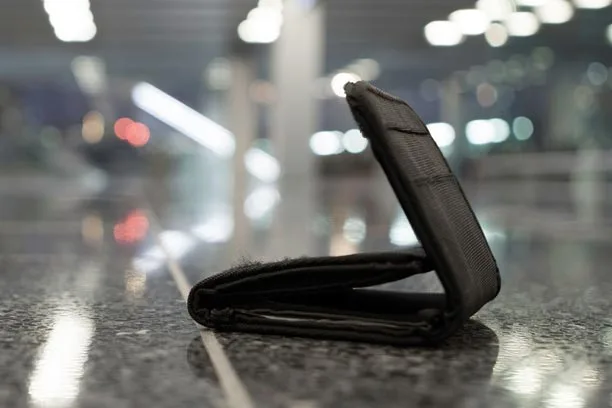I Lost My Wallet. Now What?


Discovering that you lost your wallet is one of the most frustrating feelings imaginable. You’re afraid that it will find its way into the wrong hands, exhausted by all the work you’ll have to do to cancel and restore cards and IDs, and annoyed at yourself for losing it in the first place. Maybe you set it on the counter for a moment, or left it in your rental car, or accidentally abandoned it on the restaurant table. And now it’s gone.
When you’ve lost your wallet, what should you do? What are the chances of finding a lost wallet? And how can you prevent identity theft after losing your wallet? When you have a lost wallet or handbag, it’s only natural that your first instinct is to panic. But before you do, take a deep breath. Then read through these tips for what to do if you lose your wallet and make losing your wallet just a hassle, not a tragedy.
Anyone who has your debit card has direct access to your bank account — and that includes a thief. That means a bad actor can make purchases that drain your account, which could leave you unable to pay bills and cover critical costs. If your debit card was stolen, you must report it quickly. You're protected by federal law if you do: if you notify your bank within two business days of losing a debit card, your loss is limited to $50. But you can lose as much as $500 if you don’t report the lost card within two days — and more if you wait more than 60 days. The sooner your card is canceled, the safer your account will be.
Fortunately, credit cards are less vulnerable to thieves than debit cards — your loss tops out at $50 if someone starts making fraudulent charges with your card. But that doesn’t mean you should wait to cancel your card. If a thief starts making fraudulent charges on your card, you’ll have to dispute them, so the sooner you cancel the card, the fewer disputes you’ll have to file, which will save you time and headaches. If you're having trouble remembering which cards were in your wallet when it was lost or stolen, you can access a list of all your active credit cards by checking your credit report. (You can learn how to get a free copy of your credit report here.)
Yes, it might seem drastic. But establishing a police report (and therefore a timeline with pertinent details) could be very important later. For example, if your identity is stolen and you need to dispute charges, having a police report on file could be vital to helping you back up your claims. Be prepared to provide details on how and where your wallet or purse went missing, as well as its contents.
If you keep a health insurance card in your wallet — and most of us do — you’ll want to report its disappearance to your insurance company. Medical identity theft is on the rise, with thieves using stolen information to purchase prescriptions and medical services, and leaving someone else with the bill. Check with your insurance company to see if it can provide you with a temporary ID card until a replacement arrives in the mail, just in case you have a medical emergency. Or you may be able to download a temporary ID card from your insurance company’s website or smartphone app.
Contact one of the three big credit bureaus (Equifax, Experian and TransUnion) to place a fraud alert on file. But only contact one of them. Why? They’re legally obligated to contact the other bureaus if a fraud alert is placed on your account. A fraud alert requires a credit bureau to contact you if someone tries to set up a new account under your name. Once set, a fraud alert will stay in place for 90 days — and will protect you from further identity theft. (Also consider identity theft monitoring services.)
If your wallet isn’t recovered, you’ll need to replace all of the items it contained: government IDs, credit and debit cards, insurance cards, library cards, museum and other membership cards, work IDs and more. Make a list of the items you need to replace and which organizations you need to contact to make the process of replacing those items as easy as possible.
A missing wallet isn’t always a stolen wallet. Is it possible that you dropped it or left it somewhere by mistake? If you’re able to recover a missing wallet, you’ll save yourself the headache of replacing critical items. Here are some tips.
When was the last time you remember having your wallet in your possession? Once you identify that moment, you can determine where you need to look first.
If you think you may have misplaced your wallet at a business, restaurant, bar or other similar place, call or stop by to see if anyone has turned it in. Even if it hasn’t been recovered, leave your name and phone number and ask that someone contact you if it’s found.
Don’t wait too long for it to turn up. Once you’ve determined that your purse or wallet is actually gone, act fast to reduce financial risk. It’s still possible you’ll find it, but duplicating your efforts is better than having your identity stolen.
There are a few preventive measures you can take to minimize the impact of losing your wallet, like not carrying a lot of cash, and never carrying around your Social Security card. You might also want to consider identity theft protection to protect your credit and your reputation — ask your local Farm Bureau agent for details.